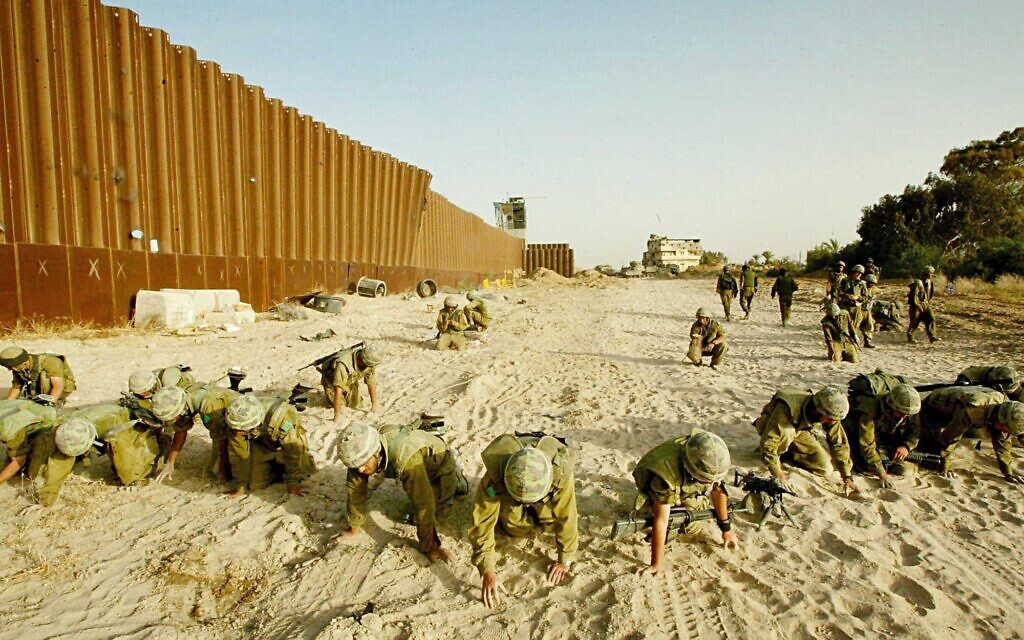OPINION: 15 years after leaving Gaza, separation from Palestinians still the key
Yair Golan, ex-deputy chief of the IDF, reflects on the impact of disengagement from Gaza, security challenges posed by settlements today and prospects for peace

I grieve over Israel’s disengagement from Gaza 15 years ago. It was a painful move which led to the destructions of homes and towns, and it shattered the dreams of many. I too share the deep and emotional bond to every part of Eretz Yisrael felt by my fellow Israeli citizens who were evacuated from their homes in the Gaza Strip and northern Samaria in the West Bank.
I have walked this land’s paths, travelled across it with my children, and defended it during my 38 years of military service. Yet the disengagement only demonstrated a principle that most Israelis have already come to accept, and those who still deny it will come round to it one day. That is the concept of separation. We must separate from the Palestinians.
As early as the beginning of the 20th century it was accepted that separation from the Palestinians is a necessary condition to the existence of the State of Israel. After the wave of terror that accompanied the Arab uprising of 1936, David Ben Gurion and his peers came to terms with the fact that there is no other choice but partition. It was this understanding that led to the Zionist acceptance of the 1947 partition plan and prevented Ben Gurion from occupying Judea and Samaria at the end of Israel’s War of Independence the following year – despite being capable of it. And it was the partition principle that led Rabin to accept the Oslo Accords and pull Israel out of Palestinian town centres and civilian life.
Get The Jewish News Daily Edition by email and never miss our top stories Free Sign Up
Even the father of the settlement movement, the late Ariel Sharon, came to accept this principle and as prime minister he devised and implemented the disengagement plan.
This plan, which has not been fully implemented, was meant to lead to de jure borders between Israelis and Palestinians.

Ultimately, despite the challenges and the fact it was made unilaterally, the 2005 disengagement from Gaza was the right move strategically, and an essential one in terms of security.
Some claim that all Israel got in return for the disengagement were rockets.
That is misleading.
The truth is that Israeli communities near the Gaza border have suffered rocket fire since 2001, years before the disengagement.
Moreover – and contrary to common myths – Israeli settlements and continued IDF presence within the Strip up to 2005 did not stop Hamas from gaining power or building tunnels into Israel.
In terms of security, the settlements were a burden that required a massive and permanent military presence, causing constant friction between the settlers and the Palestinians and between IDF forces and the local population. Fifteen years later, it is easy to forget the daily violence and the incessant killing of both soldiers and civilians in the Strip, the armoured personnel carriers accompanying school buses, the soldiers searching for the remains of their comrades in the sand, the frequent chasing after rock-throwers at places like the al-Shati refugee camp.
The reality is that in the five years before the disengagement, no less than 162 Israelis were killed in terrorist attacks in the Strip, yet in the ten years since the disengagement – double that time period, which included the 2014 Protective Edge operation – 140 Israelis were killed.
Trying to rewrite the history of disengagement as a strategic mistake is part of a messianic political campaign for a ‘Greater Israel’ that offers no security or peace for Israelis.
Its advocates understand that they must convince Israelis that settlements in Palestinian territory are essential for security. That way, the “danger” of partition – which will bring the Greater Israel vision to an end – remains off the table.
But partition is hope. If we do not separate from the Palestinians, we will have no hope for peace and security. We will find no refuge from ourselves, from our own consciences, and we will not be able to explain this to our children.
The sooner we accept and implement it, the better.
- Major General (res) Yair Golan is former deputy chief of staff of the IDF and is an MK with Meretz party

Thank you for helping to make Jewish News the leading source of news and opinion for the UK Jewish community. Today we're asking for your invaluable help to continue putting our community first in everything we do.
For as little as £5 a month you can help sustain the vital work we do in celebrating and standing up for Jewish life in Britain.
Jewish News holds our community together and keeps us connected. Like a synagogue, it’s where people turn to feel part of something bigger. It also proudly shows the rest of Britain the vibrancy and rich culture of modern Jewish life.
You can make a quick and easy one-off or monthly contribution of £5, £10, £20 or any other sum you’re comfortable with.
100% of your donation will help us continue celebrating our community, in all its dynamic diversity...
Engaging
Being a community platform means so much more than producing a newspaper and website. One of our proudest roles is media partnering with our invaluable charities to amplify the outstanding work they do to help us all.
Celebrating
There’s no shortage of oys in the world but Jewish News takes every opportunity to celebrate the joys too, through projects like Night of Heroes, 40 Under 40 and other compelling countdowns that make the community kvell with pride.
Pioneering
In the first collaboration between media outlets from different faiths, Jewish News worked with British Muslim TV and Church Times to produce a list of young activists leading the way on interfaith understanding.
Campaigning
Royal Mail issued a stamp honouring Holocaust hero Sir Nicholas Winton after a Jewish News campaign attracted more than 100,000 backers. Jewish Newsalso produces special editions of the paper highlighting pressing issues including mental health and Holocaust remembrance.
Easy access
In an age when news is readily accessible, Jewish News provides high-quality content free online and offline, removing any financial barriers to connecting people.
Voice of our community to wider society
The Jewish News team regularly appears on TV, radio and on the pages of the national press to comment on stories about the Jewish community. Easy access to the paper on the streets of London also means Jewish News provides an invaluable window into the community for the country at large.
We hope you agree all this is worth preserving.
-
By Brigit Grant
-
By Laurent Vaughan - Senior Associate (Bishop & Sewell Solicitors)
-
By Laurent Vaughan - Senior Associate (Bishop & Sewell Solicitors)
-
By Laurent Vaughan - Senior Associate (Bishop & Sewell Solicitors)
-
By Laurent Vaughan - Senior Associate (Bishop & Sewell Solicitors)






















